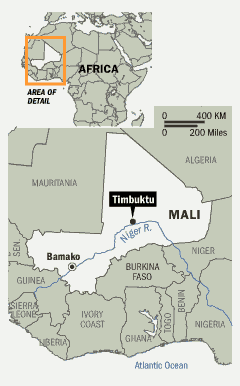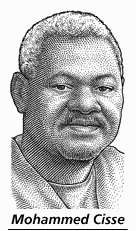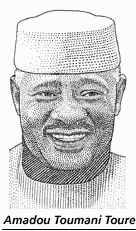Polling
Timbuktu
Islamic Democracy?
Mali Finds a Way
To Make It Work
In Old Caravan Crossroads,
History of Getting Along
Breeds Spirit of Compromise
A Coup d'État but No Junta

............................................................
|
Polling
Timbuktu
In Old Caravan Crossroads, A Coup d'État but No Junta
|
 |
By YAROSLAV
TROFIMOV
Staff
Reporter of THE
WALL STREET
JOURNAL
June 22, 2004; Page A1
TIMBUKTU, Mali -- As the sun sank over the Sahara, Mohammed Cissé straightened his pristine white robe and fired up the voters. "We'll build you good schools, letting your children study instead of becoming delinquents," he bellowed. On cue, women in brightly colored bou-bous rose up from straw mats to cheer to the beat of a drum.
The same day, sitting near an ancient mosque built of mud, a rival campaigner said the schools had only gotten worse under Mr. Cissé, Timbuktu's mayor for most of the past five years. The challenger's pitch drew equally thunderous applause from a throng jamming a sandy square that on other days is traversed by donkeys and camels.
 |
All over Mali last month, the boisterous pursuit of votes unfolded with hardly a hitch. Candidates focused on everyday issues like garbage removal and roads. Their lively campaigns showcased something highly unusual in the Muslim world: a thriving democracy. Islam and democracy haven't had a good record together, especially where mixed with deep poverty such as that of this sprawling West African country. While much of the world has moved away from authoritarian rule, the New York think tank Freedom House ranks just two of the globe's 47 Muslim-majority nations fully "free." They are Mali, a democracy since 1992, and neighboring Senegal. Mali's rare success thus stands as both a hopeful sign and a measure of the task the U.S. faces in seeking to seed democracy in Iraq and Afghanistan.
|
Some of the Muslim world's religious leaders say Western-style democracy -- rule by the people under man-made laws -- is incompatible with Islam, which has its own detailed laws and rules of behavior, regarded as God-given and immutable. In addition, dictatorial regimes in the Middle East have long claimed democracy was a luxury the region couldn't afford because Muslims needed to unite in confrontation with Israel.
Democracy might seem to face particularly long odds in Mali. The former French colony sits astride one of the world's most violent neighborhoods. To the north is Algeria, wracked by a lethal Islamist insurgency, and to the south the Ivory Coast, rent by ethnic civil war.
Mali -- bigger than Texas and California combined, with 12 million people -- is a hodgepodge of ethnic groups. Listening to Mr. Cissé campaign were black Songhay farmers in Muslim skullcaps, Arab traders with goatees, Peul cattlemen in conical leather hats, and olive-skinned Tuareg nomads whose full-face turbans left only sunglasses exposed. The diversity reflects Timbuktu's past as a caravan crossroads where the Sahara meets a bend in the muddy Niger River.
What Mali has going for it, though, is an ancient tradition of getting along, helped immeasurably by recent leaders who embraced the democratic ideal. For a thousand years, before a French conquest in the 1890s, much of the land that's now Mali was united under a series of multiethnic empires that usually respected religious freedom. This history, glorified in folk songs and epic tales, imbued Malians with a sense of common nationhood that transcends ethnic divisions and isn't common in either Africa or the Mideast.
Their pre-colonial habit of coexistence, Malians say, has spared them the twin traps of Islamic radicalism and tribal strife that derail so many democratic experiments in the developing world. And the common history means that unlike in much of the Muslim world, democracy is seen here as an outgrowth of hallowed local traditions, not an alien innovation.
"We are carrying out a unique, original experiment -- building a democracy according to our own values, according to the way we Malians are, committed to solidarity, to consensus and to dialogue," says Mali's president, Amadou Toumani Touré. "What we have here is an Islam that is very ancient, tolerant and enlightened. We see nothing in our religion that would prevent us from being democratic."
Political freedom hasn't produced prosperity. Mali no longer suffers from famine, as it sometimes did during a 23-year pro-Soviet dictatorship. But it is still a place of subsistence farming and herding, with poor health care and a life expectancy of just 41 years. Per capita income is a mere $240. Government funds often go misspent, lost to patronage and corruption.
Mali's singular path to democracy was helped, at key junctures, by leaders like President Touré. In one of Mali's many paradoxes, Mr. Touré, the man who set this country on the road to freedom, first entered politics as leader of a military putsch.
 |
In March 1991, after communism fell in Eastern Europe, Mali's capital of Bamako saw demonstrations against the country's long-serving leftist dictator, Moussa Traoré. He had his army fire on the crowds, killing more than 100. Mr. Touré, then a lieutenant colonel, was so disgusted he led his paratroop battalion to depose the dictator. But then Mali broke with the usual coup d'état script: The coup leader didn't name himself ruler. "We didn't want to confiscate the power that wasn't ours," Mr. Touré says. Instead, he organized elections for 1992 in which he declined to run. He says today that to do so would have made him seem just another military usurper. The election instead placed in office a historian, Alpha Oumar Konaré.
|
Mali's democratic experiment came close to collapse when Mr. Konaré sought re-election five years later. Opposition parties claimed fraud and boycotted the vote, unleashing aggressive street protests. But these didn't turn into an uprising -- unlike post-vote protests in Mali's neighbors -- in part because of the intricate social fabric, which includes taboos against violence among castes and ethnic groups.
That tradition is known to locals as "cousinage," and arose as a way to preserve peace as empire succeeded empire in medieval times. The descendants of winners and losers were usually made "cousins" in order to bury grievances. The tradition of loyalty to multiple cousin groups still defines social relationships in Mali, in contrast to the tribal allegiances that are the rule in much of the Arab world and tropical Africa further south.
Geography is part of the reason. Mali is largely steppe, not mountainous or forested regions conducive to ethnic redoubts. This meant ethnic groups always lived in frequent contact with each other and were easily controlled by central authority. These relationships were reinforced by trade in places like Timbuktu, for centuries a crossroads where ivory and pelts from the south were ferried over the Niger to be loaded on camels for a cross-Sahara trek to the Mediterranean.
"The national consciousness that we have in Mali, a rare country in this region that is a true nation, favors the ingredients of democracy," says Mountaga Tall, Mali's deputy parliament speaker and descendant of a famous past emperor. It was Mr. Tall who led opposition protests against the Konaré rule in 1997-2002. But, Mr. Tall says, "in this country, we have always had some red lines that we knew we just cannot cross."
That was evident in 2002, as Mr. Konaré completed his second term as president, the constitutional maximum. Elsewhere in Africa, such limits have proved easy to dodge. The leader of nearby Chad, for instance, just pushed through an amendment that let him run again. But Mr. Konaré set an example by giving up the reins.
At that point Mr. Touré, the 1991 coup leader, entered politics, now as a civilian. Championing national unity and belonging to no party, he won the presidency in a runoff against a candidate of Mr. Konaré's party. Mr. Touré, who is 55 years old, then brought into the government all of the main political forces, including the former ruling party.
The U.S., which gives vast sums to authoritarian Muslim nations of strategic importance, didn't do much for Mali until recently. But last year, Islamist guerrillas from Algeria hid out in northern Mali with European tourists they had kidnapped. Mr. Touré helped to negotiate the hostages' release. The U.S. responded by sending Special Forces to Timbuktu to train Mali's military. President Bush also is giving Mali a share of a $1 billion "Millennium Challenge" aid program for poor states that have embraced good governance.
Mr. Touré figures that democracy is essential to pull Mali out of its poverty. "Development needs peace and stability first," he says. "But we also have to allow everyone to speak out, so everyone feels involved with the country's fate."
Following the arrival of Islam in Mali -- a mainstream Sunni variety, brought by invaders from Morocco nearly 1,000 years ago -- Timbuktu grew into a place known in medieval times as the City of 333 Saints. To this day, after the rainy season, Timbuktu residents climb atop the city's mud-built 14th-century Great Mosque to patch it. Yet the mayoral campaign rarely touched on Muslim religious issues such as alcohol sales or restrictions on women.
The imam of the Great Mosque, Abdramane Ben Essayouti, says the candidates all knocked on his carved door, and he gave them all his blessings. "I am neutral and I will vote for no one," said Mr. Ben Essayouti, a large man with a white beard and gold-rimmed glasses, as another candidate walked in. "In case of problems between parties, it will be up to us in the civil society to intervene and restore peace, and how could we do it if we're not impartial?"
This clerical avoidance of politics -- a stark contrast with a politicized creed of Islam in many Muslim lands -- is another Malian tradition. Islam here is a private affair coexisting with traditional African practices and with a small but active Christian minority. Despite Islam's prohibitions on alcohol, millet beer is brewed in most villages. Bare-chested women and naked men bathe in full view in the Niger. And, reflecting animist rituals that continue, the worshippers heading to a Saudi-built mosque in Bamako pass by mounds of severed monkey heads, dried mice and cobra skins.
Even Mali's Wahhabis -- adherents of the Saudis' strict fundamentalist strain of Islam -- have adapted. "It is in everyone's interest for Mali to remain secular," says Mahmoud Dicko, imam of Bamako's Wahhabi mosque and director of the capital's Islamist radio station. Echoing him is Mali's first prime minister after the dictatorship fell, Younoussi Touré, who isn't related to the president. "When we laid the foundations of our system, we decided that Mali should be secular," says Mr. Touré, who now leads a party known by its initials, URD.
URD's candidate for Timbuktu mayor rallied crowds last month with calls for "new information technologies that will break our isolation and reconnect our youth with the young people around the world." Young women in tight T-shirts, gyrating their hips, sang mellifluously: "Vote URD, party of the most honest, party of the most worthy." But Mr. Cissé, at his own rally, laughed off some of his rivals' promises, which also included building what would be the first paved road out of dusty Timbuktu. A road would be far beyond the city's means, he said.
On May 30, Mali's people, two-thirds of whom are illiterate, lined up in the searing heat at voting stations, usually set up in crumbling school buildings. Picking up cards bearing different party logos -- 11 in Timbuktu, and several dozen in some other towns -- they went behind screens and put the card of their choice in a brown envelope, then slid it into a plastic container.
Turnout in Timbuktu was almost 49%, about that of some U.S. presidential elections. There was the usual confusion of people without correct documents, and allegations of irregularities. Afterward, as is common following every vote in Mali, losers demanded that the courts invalidate suspect results in several precincts, a process that could take several weeks.
Mr. Cissé's party garnered 14 out of 23 city council seats. The URD got three, and six went to a group known as the civic list of independents, whose candidate, Khalil Touré (no relation to either the president or the former prime minister), hinted he'd be open to joining a governing coalition.
The URD's losing candidate, Abdoul Hamid Maiga, pledged to keep up the fight. "We'll be there in the city council, and we'll keep telling the truth," he said. "I am serene."
Write to Yaroslav Trofimov at yaroslav.trofimov@wsj.com1
To post a comment on this article please click here for discussion page.